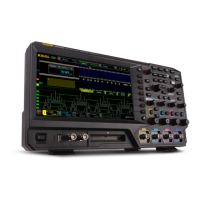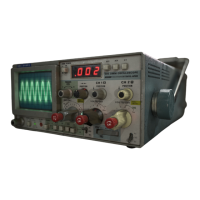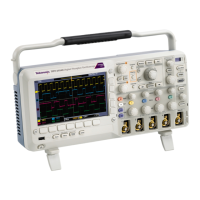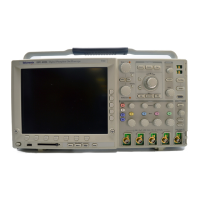Commands Listed in Alphabetical Order
SEARCH:SEARC
H<x>:TRIGger:A:TRANsition:POLarity:CH<x>
This command sets or queries the polarity setting for a transition trigger search to
determine where to place a mark. <x> is the search number or channel number.
Group
Search and Mark
Syntax
SEARCH:SEARCH<x>:TRIGger: A:TRANsition:POLarity:CH<x>
{EITher|NEGAtive|POSITIVe }
SEARCH:SEARCH<x>:TRIGger: A:TRANsition:POLarity:CH<x>?
Arguments
POSitive specifies that a pulse edge must traverse from the lower (most
negative) to higher (most positive) level for t ransition triggering to occur.
NEGative specifies that a pulse edge must traverse from the upper (most positive)
to lower (most negative) level for transition triggering to occur.
EITher specifies either positive or negative polarity.
Examples
SEARCH:SEARCH1:TRIGGER:A: TRANSITION:POLARITY:CH12 NEGATIVE,
sets the Channel 2 transition trigger polarity setting for search 1 to NEGATIVE.
SEARCH:SEARCH1:TRIGGER:A: TRANSITION:POLARITY:CH1? might return
:SEARCH:SEARCH1:TRIGGER:A :TRANSITION:POLARITY:CH1 POSITIVE,
indicating that the Channel 1 transition trigger polarity setting for search 1 is
set to POSITIVE.
SEARCH:SEARCH<x>:TRIGger:A:TRANsition:POLarity:MATH<x>
This command sets or queries the polarity setting for a transition trigger search to
determine where to place a mark. <x> is the search number or math waveform
number.
Group
Search and Mark
Syntax
SEARCH:SEARCH<x>:TRIGger: A:TRANsition:POLarity:MATH<x>
{EITher|NEGAtive|POSITIVe }
SEARCH:SEARCH<x>:TRIGger: A:TRANsition:POLarity:MATH<x>?
Arguments
POSitive specifies that a pulse edge must traverse from the lower (most
negative) to higher (most positive) level for t ransition triggering to occur.
NEGative specifies that a pulse edge must traverse from the upper (most positive)
to lower (most negative) level for transition triggering to occur.
2-472 DPO7000, DPO70000/B and DSA7000/B Series Programmer Manual

